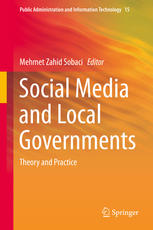

Most ebook files are in PDF format, so you can easily read them using various software such as Foxit Reader or directly on the Google Chrome browser.
Some ebook files are released by publishers in other formats such as .awz, .mobi, .epub, .fb2, etc. You may need to install specific software to read these formats on mobile/PC, such as Calibre.
Please read the tutorial at this link: https://ebookbell.com/faq
We offer FREE conversion to the popular formats you request; however, this may take some time. Therefore, right after payment, please email us, and we will try to provide the service as quickly as possible.
For some exceptional file formats or broken links (if any), please refrain from opening any disputes. Instead, email us first, and we will try to assist within a maximum of 6 hours.
EbookBell Team

4.7
96 reviewsToday, social media have attracted the attention of political actors and administrative institutions to inform citizens as a prerequisite of open and transparent administration, deliver public services, contact stakeholders, revitalize democracy, encourage the cross-agency cooperation, and contribute to knowledge management. In this context, the social media tools can contribute to the emergence of citizen-oriented, open, transparent and participatory public administration. Taking advantage of the opportunities offered by social media is not limited to central government. Local governments deploy internet-based innovative technologies that complement traditional methods in implementing different functions. This book focuses on the relationship between the local governments and social media, deals with the change that social media have caused in the organization, understanding of service provision, performance of local governments and in the relationships between local governments and their partners, and aims to advance our theoretical and empirical understanding of the growing use of social media by local governments. This book will be of interest to researchers and students in e-government, public administration, political science, communication, information science, and social media. Government officials and public managers will also find practical use recommendations for social media in several aspects of local governance